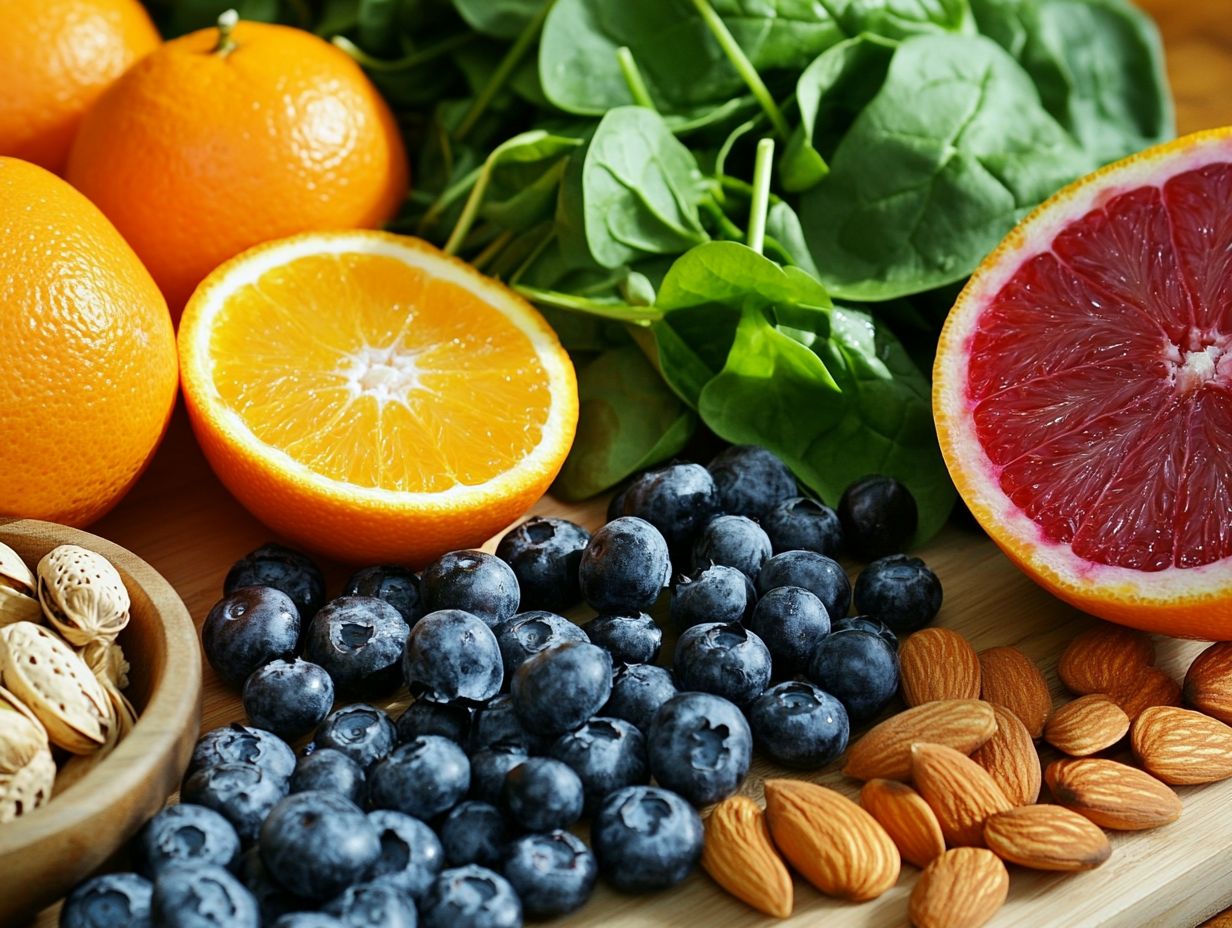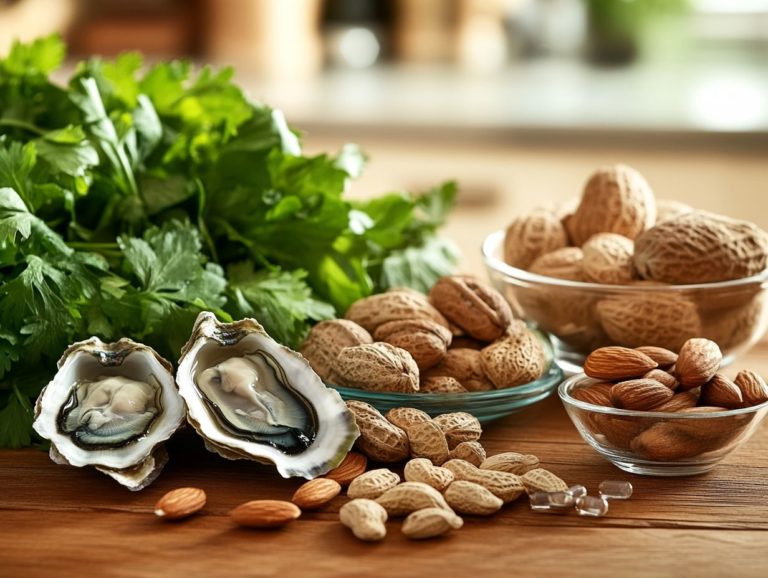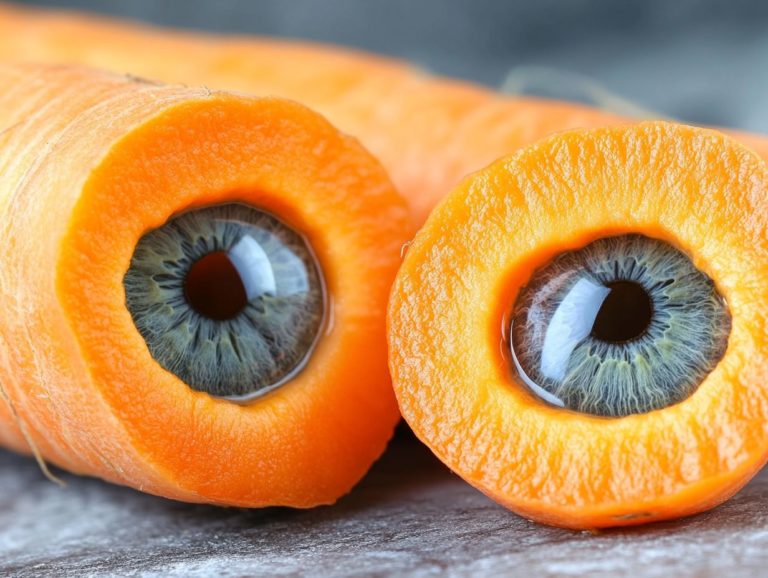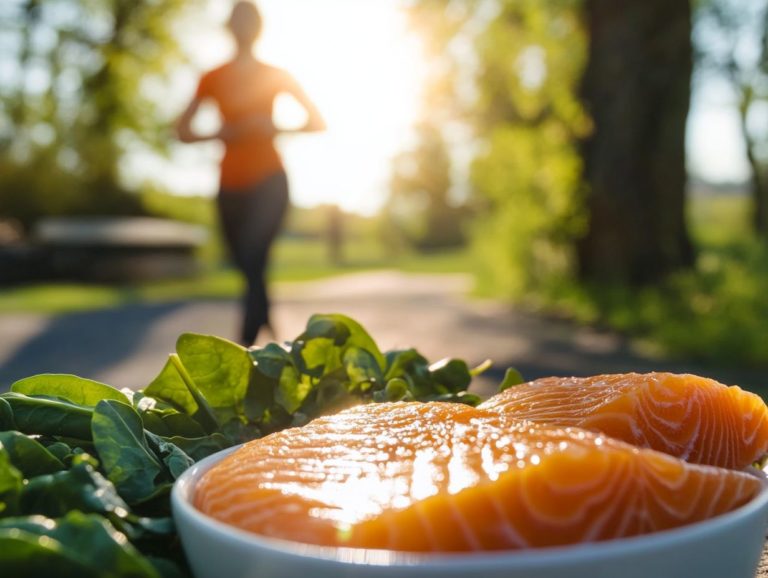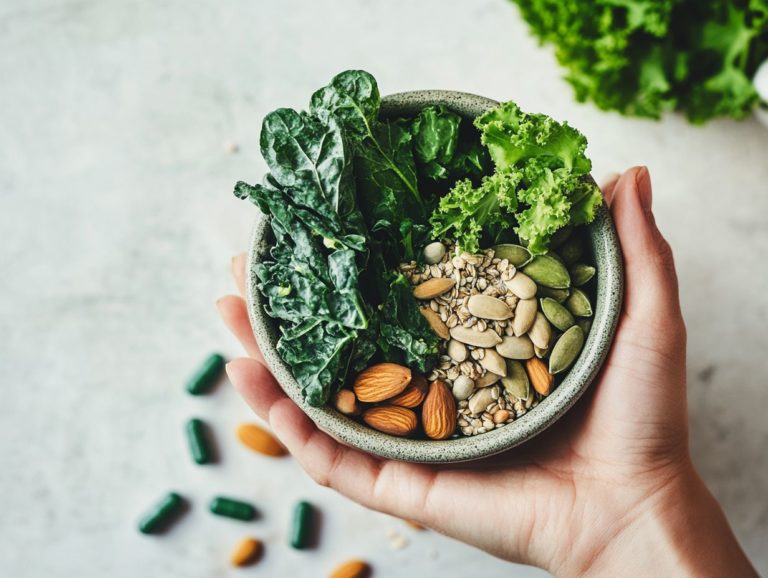The Role of Antioxidants in Overall Health
Antioxidants play a crucial role in maintaining your health by combating oxidative stress, an imbalance in the body that can harm your cells, and protecting your cells from damage.
This article delves into what antioxidants are and how they function in your body, shedding light on their significance for your overall well-being.
It explores the various types of antioxidants, distinguishing between natural and synthetic sources, while also pinpointing the top foods brimming with these powerful compounds.
You’ll also find a discussion on the effectiveness and safety of antioxidant supplements, along with practical tips on seamlessly incorporating more antioxidants into your diet.
Join in as you uncover the essential role antioxidants play in promoting a healthier lifestyle for yourself.
Contents
- Key Takeaways:
- Understanding Antioxidants
- The Importance of Antioxidants in Health
- Types of Antioxidants
- Food Sources of Antioxidants
- Supplements and Antioxidants
- Incorporating Antioxidants into Your Diet
- Frequently Asked Questions
- Curious about antioxidants? What are they and why are they important for overall health?
- Which foods are high in antioxidants?
- Can antioxidants help prevent chronic diseases?
- Are there different types of antioxidants?
- Can too much of antioxidants be harmful?
- How can I incorporate more antioxidants into my diet?
Key Takeaways:
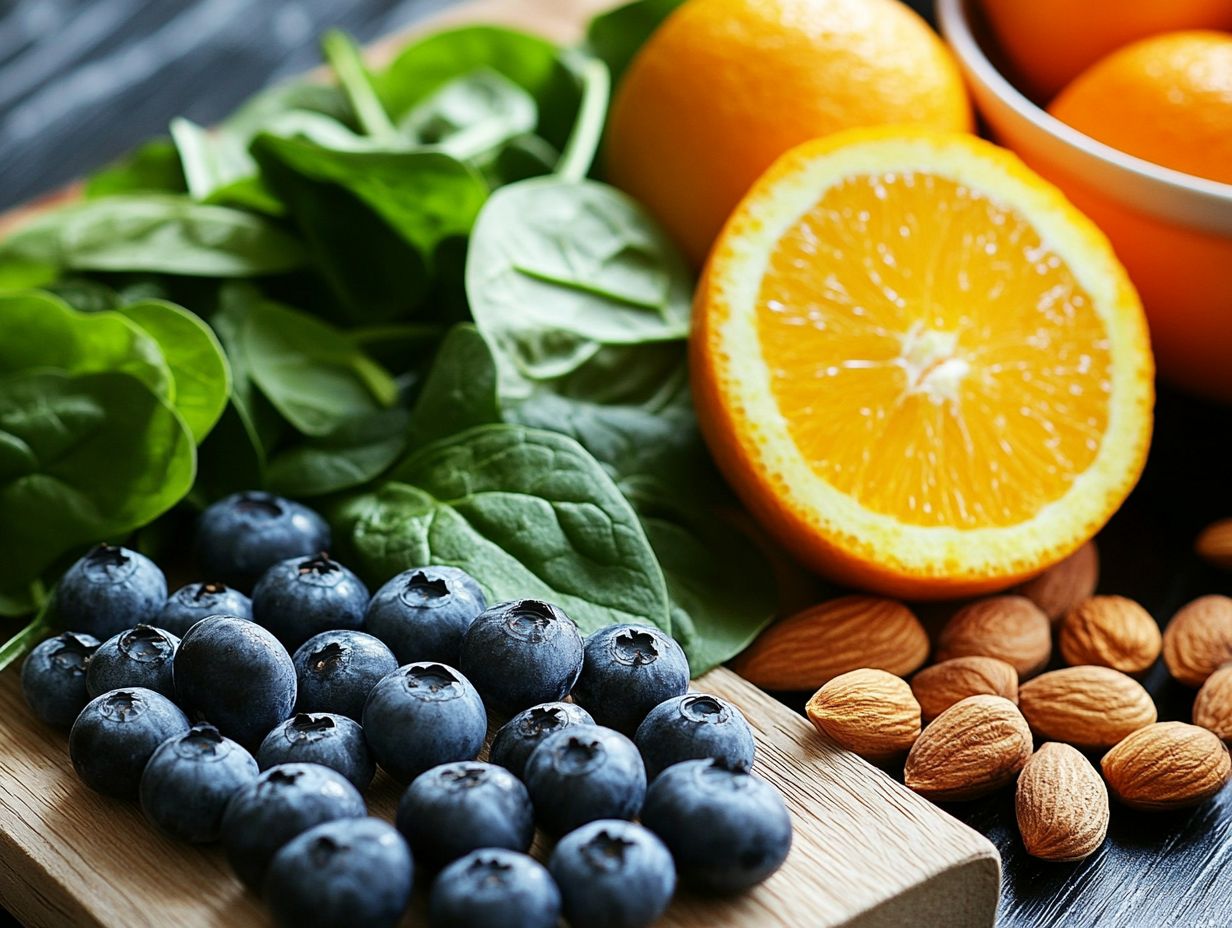
Antioxidants are vital for your health. Natural foods like fruits and veggies are the best sources. Always check with your doctor before taking supplements.
Understanding Antioxidants
Understanding antioxidants is essential for comprehending their powerful role in fighting free radicals, which can trigger oxidative stress and lead to various health issues, including heart disease and cancer.
Antioxidants like vitamin C, vitamin E, and beta-carotene are your allies in neutralizing these harmful free radicals, promoting your overall health and well-being.
They also play a critical role in preventing age-related macular degeneration, a degenerative vision condition that often comes with aging.
By incorporating antioxidants into your lifestyle, you can significantly bolster your body s defenses against chronic diseases and safeguard your health for the long run.
What are Antioxidants and How Do They Work?
Antioxidants are your body’s allies, safeguarding your cells from the harmful effects of oxidative stress brought on by free radicals those pesky unstable molecules that can lead to a range of health issues.
These troublemakers emerge from natural metabolic processes or external factors like pollution and UV radiation. Antioxidants neutralize free radicals by donating electrons, effectively maintaining your cellular integrity.
This remarkable ability helps ward off potential damage to crucial components like DNA, proteins, and lipids. Dietary sources of antioxidants, like vitamin C in citrus fruits and vitamin E in nuts and seeds, are vital for bolstering your body s defenses.
Make it a point to incorporate these nutrients into your daily meals for promoting overall health and reducing the risk of chronic diseases.
The Importance of Antioxidants in Health
The significance of antioxidants in sustaining your health is paramount. They serve a crucial function in mitigating oxidative stress, which is closely associated with chronic diseases such as heart disease, cancer, and diabetes.
Make antioxidants a priority in your diet for a healthier you!
Benefits for Overall Well-being
Antioxidants offer a wealth of health benefits that significantly enhance your overall well-being. They play a pivotal role in preventing cancer, reducing the risk of heart disease, and bolstering your immune function.
These remarkable compounds are essential for neutralizing harmful free radicals, effectively reducing oxidative stress that can cause cellular damage.
Antioxidants support crucial bodily functions, including metabolism and cellular repair, while fostering a healthier inflammatory response.
They are also linked to better brain function; for instance, flavonoids found in berries enhance brain health and memory.
By incorporating a diverse array of antioxidant-rich foods such as fruits, vegetables, nuts, and whole grains into your diet, you can cultivate a more resilient immune system, paving the way for a longer, healthier life.
Start adding antioxidant-rich foods to your meals today for a brighter, healthier tomorrow!
Types of Antioxidants
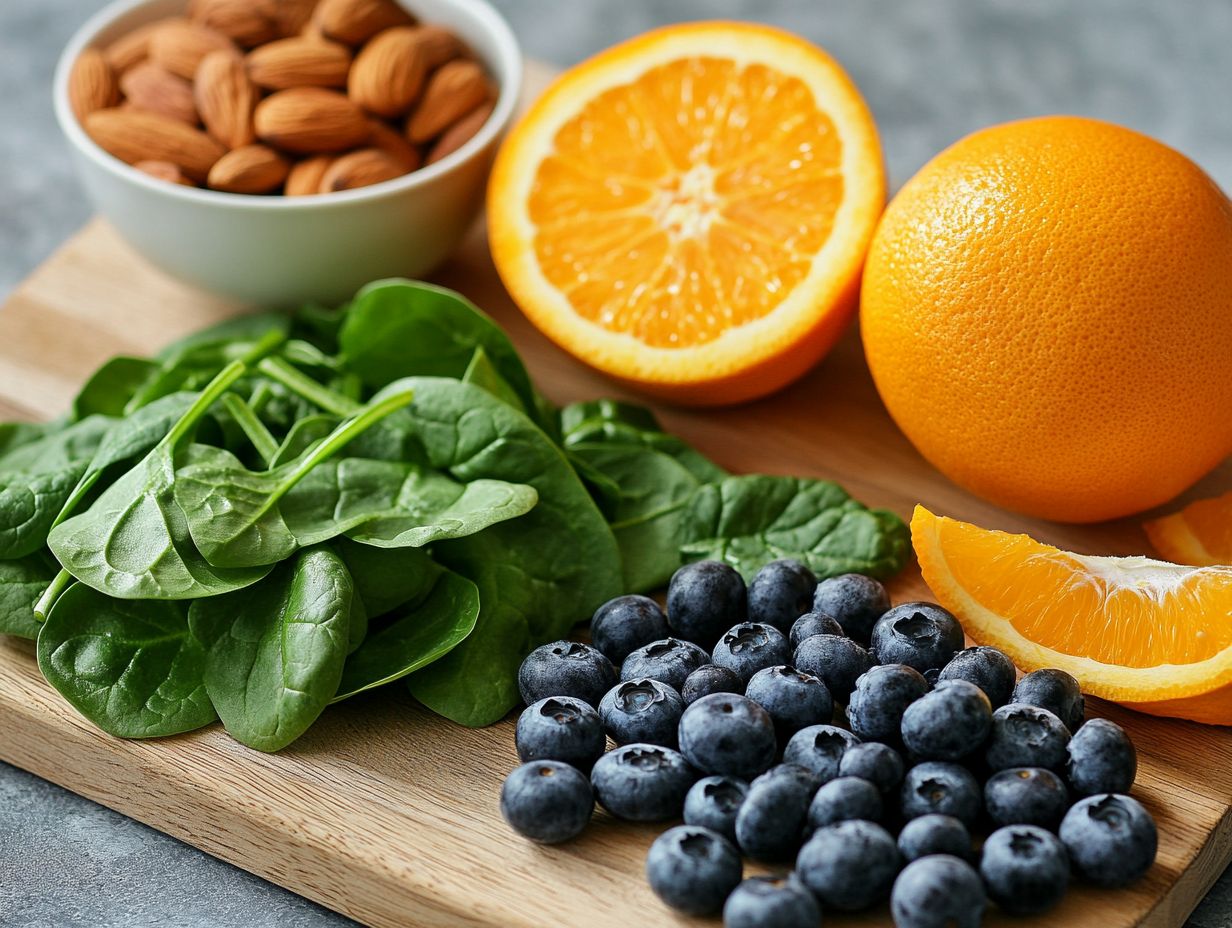
There are two primary categories of antioxidants to consider:
- Natural antioxidants, which are found in various foods.
- Synthetic antioxidants, which are added to products to enhance preservation and stability.
Natural vs. Synthetic Antioxidants
Natural antioxidants, such as vitamin C and vitamin E, are known for their many health benefits. Processed foods often contain synthetic antioxidants, valued for their preservative properties.
Both types have unique advantages, but their safety profiles differ. Natural antioxidants are widely regarded as safe and beneficial, promoting cellular health and potentially lowering the risk of chronic diseases.
However, synthetic antioxidants excel at preventing spoilage and extending shelf life. Concerns about their long-term safety and possible side effects may arise. Recent studies show that the body s ability to absorb and use these compounds can vary significantly, raising questions about the overall effectiveness of synthetic alternatives.
Carefully assess your choices to make the best of your health! Balance the benefits of nutrient-rich whole foods with the convenience of processed products.
Food Sources of Antioxidants
A wealth of food sources packed with antioxidants can be found in the colorful world of fruits and vegetables.
These natural treasures are rich in compounds like lycopene, selenium, and various phytochemicals. Phytochemicals are natural compounds found in plants that can enhance health.
Top Foods Rich in Antioxidants
Some of the best foods rich in antioxidants for your diet include berries, leafy greens, nuts, coffee, dark chocolate, and red wine. Each can significantly boost your intake of these essential compounds.
These delicious options are not just treats; they are also filled with powerful antioxidants like flavonoids, carotenoids, and polyphenols, which help combat oxidative stress.
Blueberries and strawberries are renowned for their high levels of anthocyanins, which may improve heart health and brain function.
Spinach and kale are great for eye health, providing lutein and zeaxanthin. Nuts like walnuts and almonds deliver vitamin E, promoting healthy skin.
And don t forget dark chocolate; its high cacao content can support heart health, making it a delightful addition to a balanced diet.
Supplements and Antioxidants
Antioxidant supplements, like vitamin C, vitamin E, and beta-carotene, often promise health benefits.
However, their effectiveness and safety are still under research and discussion.
Effectiveness and Safety of Antioxidant Supplements
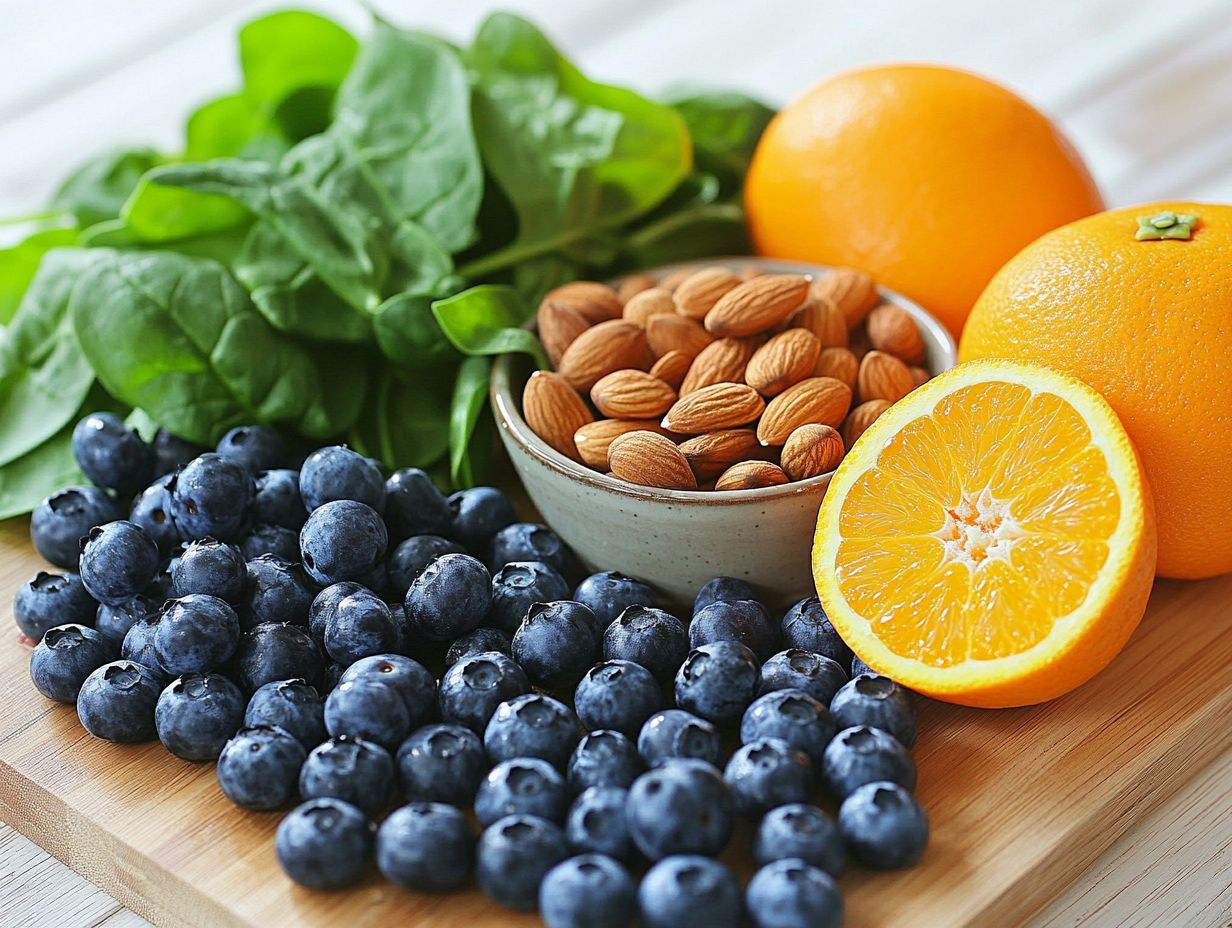
The effectiveness and safety of antioxidant supplements can depend significantly on your individual health conditions and dietary needs. Consulting healthcare providers before starting any supplementation is essential.
Recent studies suggest these supplements can offer remarkable benefits, especially in reducing oxidative stress and enhancing overall health. However, they may also carry specific risks, particularly when taken in high doses or without professional guidance.
Not everyone may need additional antioxidants; a balanced diet rich in fruits and vegetables usually provides sufficient levels.
Research has also pointed out potential interactions with some medications and other supplements, which could lead to unexpected complications. Evaluating your health circumstances and monitoring your intake is crucial for achieving desired health outcomes without compromising safety.
Incorporating Antioxidants into Your Diet
Incorporating antioxidants into your diet offers a simple yet effective way to enhance your overall health.
By emphasizing fruits, vegetables, and other antioxidant-rich foods, you can start enjoying the multitude of health benefits today!
Tips for Increasing Antioxidant Intake
To elevate your antioxidant intake, focus on incorporating a diverse array of colorful fruits and vegetables into your meals. Each hue often signifies a different type of antioxidant.
Imagine the vibrant red of tomatoes, the rich purple of eggplants, and the bright orange of carrots gracing your plate. Not only do these colors make your dishes visually stunning, but they also maximize your nutritional benefits.
Start your day with a delightful smoothie crafted from spinach, strawberries, and blueberries each ingredient brimming with vitamins and natural compounds found in plants that are good for health.
Try a hearty quinoa salad adorned with kale, bell peppers, and chickpeas for lunch. It delivers a substantial nutritional boost!
For cooking methods, opt for steaming or roasting. These techniques preserve valuable nutrients, ensuring that every meal is as delicious as it is healthful.
A sprinkle of spices like turmeric and cinnamon can enhance your dishes, as they too are packed with antioxidants. Don t miss out on vibrant, antioxidant-rich meals! Start today!
Frequently Asked Questions
Curious about antioxidants? What are they and why are they important for overall health?
Antioxidants are compounds that help protect our cells from damage caused by harmful molecules known as free radicals. These free radicals can contribute to various health issues, making antioxidants crucial for maintaining overall health.
Which foods are high in antioxidants?
Fruits and vegetables, especially brightly colored ones like berries, leafy greens, and bell peppers, are excellent sources of antioxidants. Nuts, seeds, and whole grains also contain high levels of antioxidants.
Can antioxidants help prevent chronic diseases?
Research shows antioxidants can help prevent chronic diseases such as cancer, heart disease, and Alzheimer’s. However, a balanced diet and healthy lifestyle habits are also essential for disease prevention.
Are there different types of antioxidants?
Yes, there are different types of antioxidants, including vitamins A, C, and E, beta-carotene, lycopene, and selenium. Each type has its unique properties and benefits for overall health.
Can too much of antioxidants be harmful?
While antioxidants are beneficial for overall health, excessive intake in supplement form may have adverse effects. It is best to get antioxidants from whole foods rather than relying on supplements.
How can I incorporate more antioxidants into my diet?
Adding more fruits and vegetables to your meals and snacks is an easy way to boost your antioxidant intake. You can also try incorporating superfoods like blueberries, kale, and almonds into your diet to increase your antioxidant intake.

